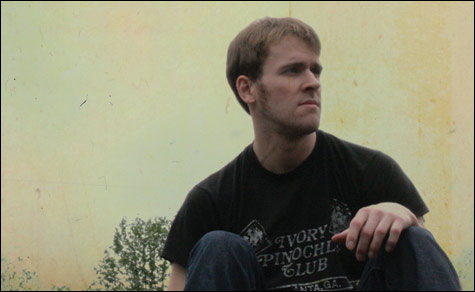
BURYING YOU WITH WORDS: mauled bubbled clods knotted clogged rot foam mold growth cragged bugged curdle boils lumps ooze gunk stung and on and on. |
| Scorch Atlas | by Blake Butler | Featherproof Books | 152 pages | $14.95 [paperback] |
Blake Butler aims his telescope at the future, and if what he finds there and shows us in Scorch Atlas even approaches the truth, we can all only hope we won't be around to see it.I'm reluctant to refer to this full-length debut as a novel, even as a novel-in-stories. It's more a tour, a guided circuit of a ruined world. And it's less post-apocalyptic than it is contemporary, less aftermath and more in the heat and squelch of a horrid, horrifying end. "I let my baby witness the swan dive of our destruction . . . the way the world had come to rash . . . and how the ground would split apart . . . the pastures of dead cattle already rotten . . . the mayonnaise on the sandwich no one would ever eat and the babies with their hair tongues like my baby here like mine." The people in this world, regular folks, moms and dads and kids, can't do much amid the chaos except let it unfold around them and do their best to stay afloat or uncut or breathing.
The sky is, throughout, an enemy — it rains soil and gravel and glass. "Above, the sky made bubble, blurred with humid grog." A sentence like that might come as surprise in other books. Not here. Scorch Atlas doesn't make its point with narrative arc or character development or paragraphs or even the lovely, terrible sentences. Instead, it's the heaping of words — mauled bubbled clods knotted clogged rot foam mold growth cragged bugged curdle boils lumps ooze gunk stung and on and on — that press on you, as if you were being buried, drowned, dissolved, as if you were about to swallow your tongue.
In "Television Milk," three untamed sons make their mother a captive. They tie her down and suck her breasts. "Tum — awkward and fumbly, just near an age he might have begun to dream of women — he took my nipple in his mouth with his arms crossed over his chest, eyes anywhere but on me." In "The Ruined Child," a mother and father drown their baby because "where once he'd had the father's features, his skin expunged a short white rind." The baby comes back, though, and grows to monstrous size, inhabiting the attic and prognosticating with a "runny mouth."
Although the characters have memories of a better time, hope does not spring eternal. Or at all. In "Caterpillar," one of the 13 shorts that precede each story, "wriggling ropes of segmented flesh" infest the world. Even the transformation into butterflies proves a horror: "In the end, the great unveiling: ten billion butterflies humming in the sun, fluttering so loud you couldn't think." Butler's integrity is patent; you never get the sense of gross-out for the sake of gross-out. (His vow that he'll eat his book, one page at a time, for you to watch on-line is another story: he pours ketchup and hot sauce onto a shredded page two and forks it into his mouth.)